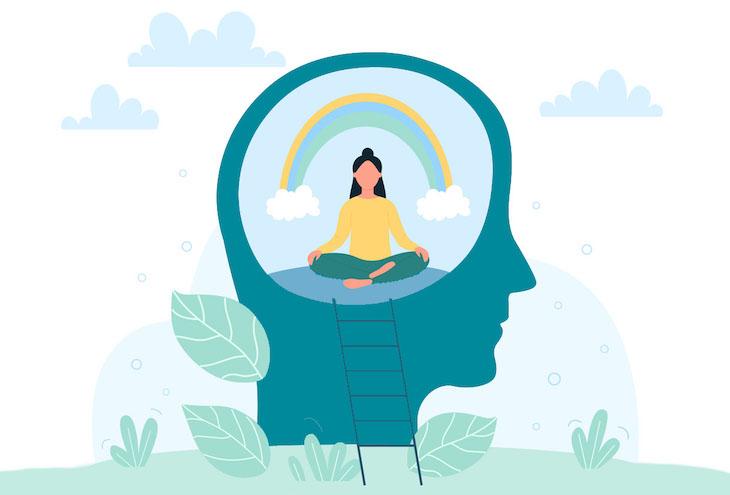The end of the academic year is near, which means the pressure of finishing projects and exams, landing summer internships and jobs, and lining things up for the fall is in full force. You want to finish out the year strong, so it’s important to remember to use the tools you have to support your mental health. Ideally, you’ve set yourself up for strong mental health all year by following a healthy routine, joining clubs, and spending time with supportive people. If you find yourself becoming overwhelmed, however, there are steps you can take to regain control.
Know When You’re Stressed
Learning to cope with stress in a healthy way is an important life skill. The first step is recognizing that you are stressed. Common symptoms include problems sleeping; trouble concentrating and making decisions; physical pain, such as headaches, stomach aches, skin rashes, and body pain; feelings of sadness, fear, worry, or frustration; and changes in appetite, energy, and interests. Once you’ve identified that you’re stressed, it’s time to take action.
Healthy Body, Healthy Mind
According to the Centers for Disease Control and Prevention (CDC), staying physically healthy can improve your emotional well-being. Be sure you’re eating fruits and veggies in addition to lean protein, whole grains, and low-fat or no-fat dairy. Treats are fine, but try to limit foods that are high in unhealthy fats, salt, and sugar. Also, be sure you’re getting enough sleep. Establishing a sleep routine that has you going to bed and waking up at the same time each day will help you sleep better. Just be sure you allow enough time to sleep — the CDC suggests adults need at least seven hours of shut-eye each night. Finally, move your body. Work on reducing the time you are sitting or being inactive and increasing your movement. Even 20 to 30 minutes of active time each day can make a big difference in your mental health.
Reduce Outside “Noise”
Studies have shown that exposure to social media, news stories, and negative content takes a toll on your mental health. While it’s important to stay informed about current events, there’s no need for constant interruptions and updates, especially when the news is upsetting. Try limiting your checks on the news to just a few times a day, then disconnect from your phone, computer, and TV. Cutting back on all the “noise” will help declutter your mind and reduce unwanted stressors so you’re more focused on what matters in your own life.
Make Good Choices
While pop culture normalizes using alcohol and other substances to cope with stress, it’s not a wise choice. Avoid turning to alcohol or illegal or prescription drugs to escape. Likewise, avoid smoking, vaping, and other tobacco products that can negatively impact your long-term physical health. Instead, take time to relax your mind and body. Try breathing exercises, yoga, or other activities you enjoy doing on your own. Or spend time with your people — those who make you feel happy, share your interests, and allow you to express yourself. If you are feeling down or overwhelmed, it helps to talk with people you trust about your feelings or seek the help of a counselor.
We all experience different levels of stress throughout our lives. Acknowledge when you’re feeling overwhelmed and take steps to curb any negative effect. Adjusting your sleep, diet, and exercise routines can help, as can taking a break from the headlines and social media. While we can’t escape stress, we can manage it.
On Topic
It’s a fact: stress affects people of all ages. While the relative level of stress may vary, the human response is similar. People lash out, have trouble sleeping, can’t focus, and even feel physically ill. How quickly you address your feelings of stress can directly impact how disruptive it can be. We asked students from elementary school through graduate school how they deal with stress. Here’s what they had to say.
"I have trouble going from a busy school day to being home. It helps to have time alone to play with kinetic sand or beads before starting my homework. I like how the sand and beads feel going through my fingers. It makes me feel good and calm, and I get in a better mood." – Jane, 8
"When I am feeling stressed, I like to paint and use my imagination to temporarily take my mind off of what’s bothering me." – Lizzy, 13
"When I’m feeling overwhelmed with schoolwork, I like to listen to my calming playlist, which is just a list of songs that I like. It helps me relax before I start my homework." – Lucy, 15
"Sometimes it can be hard to focus on homework after being in school all day, so I like to go for a run. The combination of moving my body and getting fresh air helps me clear my head and then I’m able to focus better." – Carney, 16
"Going to the beach is the best way for me to relieve stress. Even if it’s too cold to go out on the beach, I love to just watch the waves." – David, 20
"Something I find helpful is making time for purposeful pauses. I take a moment to reflect and focus every so often, rather than waiting until everything piles up and stress is through the roof." – Andrew, 22
"Intramural games are the perfect diversion when I’m stressed. They take my mind off the stressor for an hour, and I always come back feeling refreshed." – Chris, 24
"Walking! I find more intense exercise, like running and lifting weights to be tough when I’m stressed, but just going outside for a quick walk and fresh air helps me clear my head and keep things in perspective." – Sarah, 26














